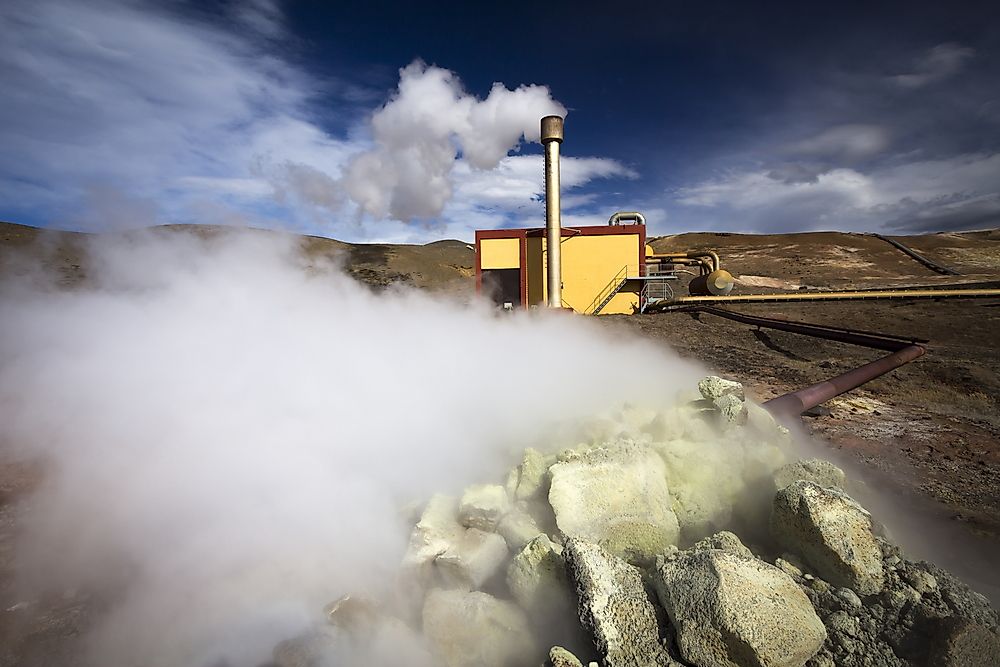Countries Least Dependent On Fossil Fuel Sources For Energy Needs

Fossil fuels can include natural gas, oil, and coal. They are currently the world's primary source of energy. Fossil fuels are formed from organic material over the course of millions of years. Such energy sources have fueled many countries resulting in their global economic development over the past century. Fossil fuels are, however, limited resources that can cause irreparable damage to the environment. At present, some of the world's environmentally-minded countries continue to embrace the use of alternative energy sources. Here we take a look at some of these countries and their use of alternative energy sources:
1. Iceland
89.0% of the total energy requirement of Iceland is satisfied by non-fossil fuel energy sources, the highest among the countries of the world. The country makes good use of its comprehensive natural geothermal resources to power its small but exceptionally well-developed green economy. Iceland produces 65% of its energy from geothermal sources and 20% from hydropower.
2. Tajikistan
With 64.1% of renewable energy, Tajikistan is the second country least dependent on fossil fuels. Tajikistan primarily benefits from its large hydroelectric plants. About 94% of the country's electricity generating capacity is hydroelectric, but only a small percentage of its potential is used. At present, the government of Tajikistan is focused on attracting investors for hydropower projects and electricity exports.
3. Sweden
Sweden's limit on the use of coal has been so successful that it has been commended by the International Energy Agency (IAE) for its new energy policies. The country uses about 48.5% of non-fossil energy and started producing even more energy from biomass by 2010. The move to non-fossil fuels has placed Sweden high on the list of green countries.
4. France
France is among the countries least dependent on fossil fuel sources, with 47.0% of its total energy requirement being non-fossil. At around 10%, France is the only country in which hydropower plays a small part in its energy production. Instead, the country produces 75% of its energy from nuclear power. However, by 2025, this share is set to fall to 50%.
5. Switzerland
With abundant hydroelectric sources, Switzerland uses about 39.5% non-fossil fuel sources for energy production. About 60% of the country's generated electricity with hydropower accounting for 57% and nuclear power accounting for 38%. The country's wind power and photovoltaic represents less than 0.2%, but their contribution to energy production is set to increase in the future.
6. Costa Rica
With 38.7% of the total energy requirement being non-fossil, Costa Rica is among the countries who are least dependent on fossil fuel. In the beginning of 2015, Costa Rica decided to go completely green. The shift will not only preserve Costa Rica's natural resources but will also ensure that the country continues to thrive from its lucrative ecotourism industry. One of the country's renewable efforts includes utilizing rainfall water to power its growing hydroelectric infrastructure.
7. Norway
The top three energy sources in Norway are geothermal, hydroelectric, and wind. Of the total energy requirement, 34.0% accounts for non-fossil fuels. However, the country's renewable energy sector has developed to serve the export market rather than for domestic consumption.
8. El Salvador
Around 33.8% of the total energy used in El Salvador is from non-fossil fuel sources, making the country among the least dependent on fossil fuels for energy needs. The country's National Energy Policy aims at diversifying its power matrix thus reducing its oil dependency by adding more renewable capacity. In Central America, El Salvador is the largest producer of geothermal energy - it also makes use of hydroelectric power.
9. New Zealand
New Zealand primarily uses geothermal power and hydropower with approximately 80% of its electricity coming from renewable energy. In the country, about 40% of primary energy is from renewable energy sources. Hellen Clark, the country's former Prime Minister, had announced a national target of 90% renewable electricity by 2025 in September 2007 with wind energy accounting for the increase. About 31.5% of the total energy required in New Zealand is satisfied by non-fossil fuel energy sources.
10. Kyrgyzstan
Kyrgyzstan uses 29.5% of non-fossil fuel energy sources for its total energy requirement. The country has small amounts of fossil fuels but enjoys massive amounts of water resources and an abundant supply of hydropower. The country's generating capacity is mainly hydropower. Kyrgyzstan has for some time been considering the development of hydropower resources as the center of its economic development.
Benefits Of Using Non-fossil Fuels
Renewable energy is advantageous in that it is derived from sources that are never ending and can be replenished time after time. Renewable energy is considered clean energy as it does not cause adverse environmental pollution. Despite there being some disadvantages of using renewable energy the advantages outweigh them by far, thus making the shift from fossil fuels to non-fossil fuels a wise move.
Countries Least Dependent On Fossil Fuel Sources For Energy Needs
| Rank | Country | Alternative And Nuclear Energy (% of total energy use) |
|---|---|---|
| 1 | Iceland | 89.0 |
| 2 | Tajikistan | 64.1 |
| 3 | Sweden | 48.5 |
| 4 | France | 47.0 |
| 5 | Switzerland | 39.5 |
| 6 | Costa Rica | 38.7 |
| 7 | Norway | 34.0 |
| 8 | El Salvador | 33.8 |
| 9 | New Zealand | 31.5 |
| 10 | Kyrgyzstan | 29.5 |











